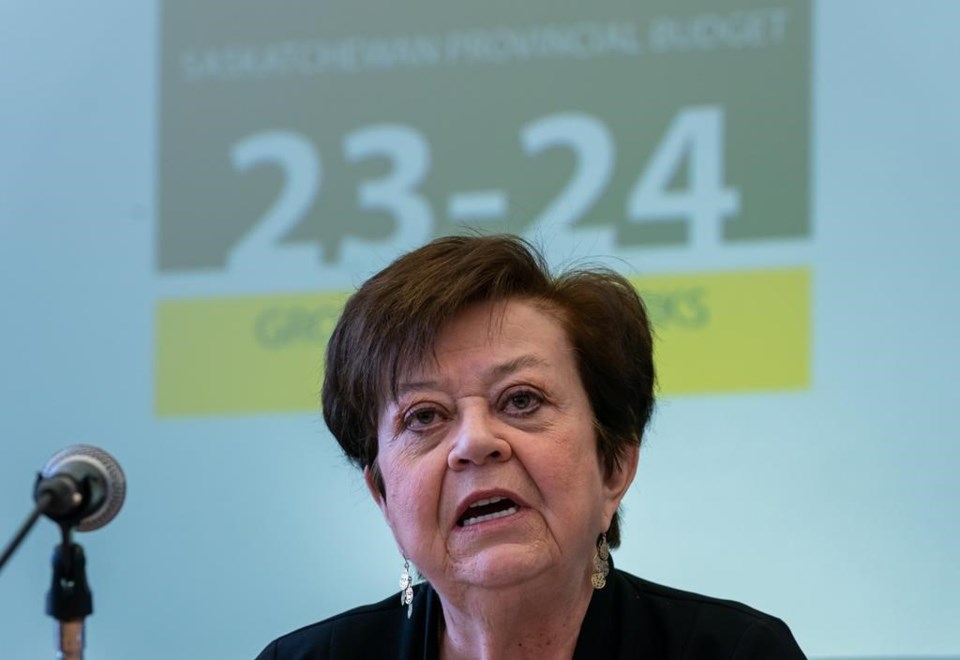REGINA — The Saskatchewan Party government is forecasting a lower surplus than budgeted this year due to decreased resource revenues and higher expenses.
In her first-quarter fiscal update Thursday, Finance Minister Donna Harpauer said the province expects a $485.5-million surplus this year, down 52 per cent from the $1-billion surplus that was projected in the spring.
Harpauer said revenues are forecast to be $19.6 billion, down 0.6 per cent, largely due to an expected reduction in resource revenues.
She said potash and oil prices are lower than what was forecast. It's expected non-renewable resource revenues are to be $528.9 million lower than what the government initially projected.
"Saskatchewan's finances continue to be in a strong position, with a substantial surplus," Harpauer said in a news release Thursday.
"The forecast, however, clearly demonstrates the need to be prudent and manage spending carefully, as resource revenue is volatile and forecasts can change quickly due to global impacts on prices and production."
Harpauer said expenses are forecast to be $19.1 billion, a 2.2 per cent increase from the budget.
She said the government spent more this quarter due to wildfires this spring, as well as a non-cash pension expense.
The province forecasts it is to spend $89 million on wildfires this year and a combined $317.2 million on education, general government and finance charges, primarily attributable to the pension expense.
The minister said higher expenses are expected to be offset by more tax revenue, particularly the provincial sales tax.
The province forecasts it is to receive about $9.8 billion in tax revenue this year, a two per cent increase — or about $150 million more — from the $9.6 billion that was budgeted.
Harpauer said the government plans to pay up to $1 billion on the operating debt. She said the province is able to do so because of higher cash balances at the end of last fiscal year.
She said recent debt payments are to result in interest savings of $110 million annually. The province's operating debt is forecast to be $7.5 billion by the end of this fiscal year.
Harpauer said this results in "savings that go directly into supporting priority programs, services and infrastructure for Saskatchewan people."
Opposition NDP finance critic Trent Wotherspoon said the province should use the "windfall revenues" to provide relief to people struggling to afford the cost of living.
He said the province could reduce the provincial sales tax, cut the fuel tax or cancel power rate increases.
In 2022, the government had expanded the application of the sales tax to event and movie theatre tickets, as well as increased fee amounts for hunting licences and other memberships. Utility rates have also been increased.
"It doesn't help our long-term fiscal sustainability and strength to ignore the reality that families are facing," Wotherspoon said. "And to tip them into a more precarious financial situation, it's an awful thing for families."
He described the increase in taxation revenue as huge.
"This is a government that has brought about the biggest tax hike in Saskatchewan history. And they stuck that directly on the backs of households, making the stress (people) face even worse."
Last year, to address affordability concerns, the province had mailed a $500 cheque to each resident over age 18.
Harpauer told reporters in Saskatoon there are no plans currently for the government to offer another affordability cheque.
She said the province expects to face further fiscal pressures this year, including higher crop insurance payments for producers experiencing drought.
Harpauer said the province also hasn't yet budgeted for the expected increase in salaries for teachers, who are currently in collective bargaining.
The province can make decisions, such as a tax cut, closer to the end of the fiscal year, she said.
"It's been rather volatile with turmoil in Europe and disruptions in the supply chain have made predictions more difficult."
The province's net-debt-to-GDP is projected to be 13.4 per cent at the end of this fiscal year.
Harpauer said private-sector analysts have forecast the province's real GDP is expected to grow by 1.8 per cent in 2023.
This report by The Canadian Press was first published Aug. 31, 2023
Jeremy Simes, The Canadian Press



